The global cardiac monitoring and cardiac rhythm management devices market is expected to grow from USD 23 billion in 2025 to approximately USD 35.2 billion by 2035, recording an absolute increase of USD 12.4 billion over the forecast period. This translates into a total growth of 54.5%, with the market forecast to expand at a compound annual growth rate (CAGR) of 4.4% between 2025 and 2035. The overall market size is expected to grow by nearly 1.5X during the same period, supported by the rising prevalence of cardiovascular diseases and increasing demand for advanced cardiac care solutions across healthcare facilities worldwide.
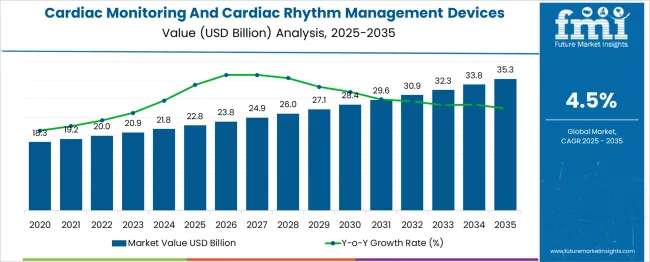
Between 2025 and 2030, the cardiac monitoring and cardiac rhythm management devices market is projected to expand from USD 23 billion to USD 28.3 billion, resulting in a value increase of USD 5.5 billion, which represents 44.6% of the total forecast growth for the decade. This phase of growth will be shaped by rising prevalence of atrial fibrillation and heart failure, increasing adoption of remote patient monitoring systems, and growing awareness of preventive cardiac care. Manufacturers are expanding their product portfolios to address the growing complexity of cardiac conditions across aging populations and diverse healthcare settings.
From 2030 to 2035, the market is forecast to grow from USD 28.3 billion to USD 35.2 billion, adding another USD 7 billion, which constitutes 55.4% of the overall ten-year expansion. This period is expected to be characterized by widespread deployment of AI-powered diagnostic systems, integration of wireless monitoring technologies, and development of miniaturized implantable devices. The growing emphasis on personalized cardiac care and early intervention strategies will drive demand for more sophisticated monitoring and management devices with enhanced connectivity and data analytics capabilities.
| Metric | Value |
|---|---|
| Estimated Value in (2025E) | USD 23 billion |
| Forecast Value in (2035F) | USD 35.2 billion |
| Forecast CAGR (2025 to 2035) | 4.4% |
Market expansion is being supported by the rapid increase in cardiovascular disease prevalence worldwide and the corresponding need for advanced monitoring and treatment solutions that can provide continuous patient care and early intervention capabilities. Modern healthcare systems rely on cardiac monitoring and rhythm management devices to ensure optimal patient outcomes, reduce hospital readmissions, and enable proactive treatment approaches. The growing complexity of cardiac conditions and increasing emphasis on patient-centered care are driving demand for sophisticated medical devices from certified manufacturers with appropriate clinical validation and regulatory approval.
The expanding aging population and rising lifestyle-related cardiac risk factors are creating significant demand for comprehensive cardiac care solutions that can provide long-term monitoring and therapeutic intervention. Healthcare regulations emphasizing quality outcomes and cost-effective care are establishing new requirements for cardiac device technologies that require advanced connectivity features and integrated care management capabilities.
The market is segmented by product outlook, end use, and region. By product outlook, the market is divided into cardiac rhythm management devices and cardiac monitoring devices. Cardiac rhythm management devices include cardiac resynchronization therapy (CRT), defibrillators, and pacemakers. Cardiac monitoring devices include ECG, implantable cardiac monitors, holter monitors, and mobile cardiac telemetry. Based on end use, the market is categorized into hospitals, ambulatory surgery centers, and others. Regionally, the market is divided into North America, Europe, East Asia, South Asia & Pacific, Latin America, and Middle East & Africa.
Cardiac rhythm management devices are projected to account for 67% of the cardiac monitoring and cardiac rhythm management devices market in 2025. This leading share is supported by the critical importance of rhythm management in treating life-threatening arrhythmias and heart failure conditions. Cardiac rhythm management devices including pacemakers, defibrillators, and CRT systems provide essential therapeutic interventions that directly impact patient survival and quality of life. The segment benefits from continuous technological advancement and comprehensive clinical evidence supporting device efficacy.
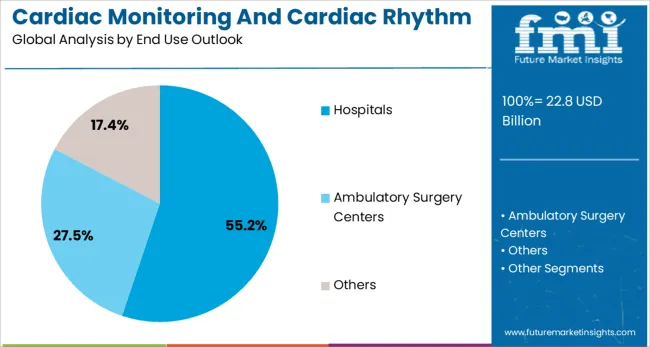
Hospitals are expected to represent 55.2% of the end use segment in 2025. This dominant share reflects the primary role of hospitals in providing acute cardiac care, complex device implantation procedures, and comprehensive patient monitoring services. Hospital settings offer the necessary infrastructure, specialized personnel, and emergency support capabilities required for cardiac device procedures and patient management. The segment benefits from established reimbursement systems and comprehensive care protocols that support cardiac device utilization.
The cardiac monitoring and cardiac rhythm management devices market is advancing steadily due to increasing cardiovascular disease burden and growing recognition of early intervention benefits. However, the market faces challenges including high device costs, complex reimbursement requirements, and need for specialized clinical expertise. Regulatory approval processes and clinical evidence requirements continue to influence product development and market adoption timelines.
The growing deployment of wireless cardiac monitoring systems and telehealth platforms is enabling continuous patient surveillance outside traditional healthcare settings. Remote monitoring technologies provide real-time data transmission and automated alert systems that facilitate early intervention and reduce hospital readmissions. These advanced systems are particularly valuable for chronic cardiac condition management where continuous monitoring can prevent acute episodes and optimize treatment outcomes.
Modern cardiac device manufacturers are incorporating AI algorithms and machine learning capabilities that enhance diagnostic accuracy and predictive analytics for cardiac events. The integration of cloud-based data platforms and advanced analytics enables personalized treatment approaches and effective population health management strategies. Advanced AI systems also support clinical decision-making and automated device optimization based on individual patient parameters.
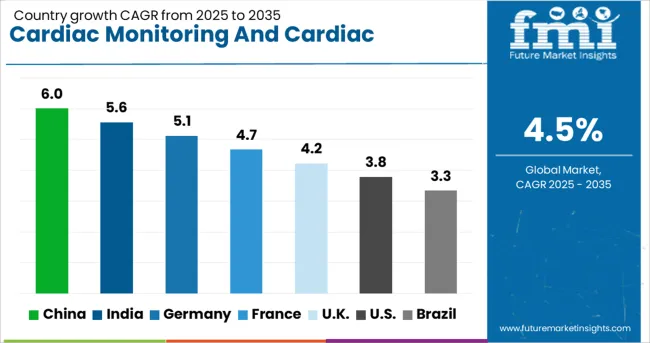
| Country | CAGR (2025 to 2035) |
|---|---|
| China | 6% |
| India | 5.6% |
| Germany | 5.1% |
| France | 4.7% |
| United Kingdom | 4.2% |
| United States | 3.8% |
| Brazil | 3.3% |
The cardiac monitoring and cardiac rhythm management devices market demonstrates solid growth across major economies, with China leading at a 6% CAGR through 2035, driven by healthcare infrastructure development and increasing cardiovascular disease awareness. India follows at 5.6%, supported by expanding healthcare access and growing middle-class healthcare spending. Germany records 5.1% growth, emphasizing clinical innovation and comprehensive cardiac care programs. France shows 4.7% expansion, driven by healthcare system modernization and demographic trends. The United Kingdom demonstrates 4.2% growth, focusing on NHS efficiency and patient outcome improvement. The United States records 3.8% growth, supported by established healthcare infrastructure, while Brazil grows at 3.3% with developing cardiac care capabilities.
The report covers an in-depth analysis of 40+ countries; seven top-performing countries are highlighted below.
Revenue from cardiac monitoring and cardiac rhythm management devices in China is projected to exhibit the highest growth rate with a CAGR of 6% through 2035, driven by comprehensive healthcare system modernization and increasing cardiovascular disease prevalence. The country's expanding healthcare infrastructure and growing awareness of cardiac care importance are creating significant demand for advanced monitoring and treatment devices. Major healthcare institutions are establishing comprehensive cardiac care programs to support the growing patient population requiring specialized cardiovascular interventions.
Government healthcare reform initiatives are mandating improvement of cardiac care capabilities and establishing supportive reimbursement frameworks, driving investment in advanced cardiac device technologies throughout major medical centers. Healthcare infrastructure development programs are supporting establishment of specialized cardiac facilities and training programs that enhance clinical capabilities across regional healthcare networks.
Revenue from cardiac monitoring and cardiac rhythm management devices in India is expanding at a CAGR of 5.6%, supported by improving healthcare access and growing middle-class healthcare expenditure. The country's increasing cardiovascular disease burden and expanding private healthcare sector are driving demand for advanced cardiac care technologies. Healthcare providers and medical institutions are gradually establishing comprehensive cardiac care capabilities to serve the growing patient population requiring specialized treatment.
Healthcare sector development and medical tourism growth are creating opportunities for cardiac device suppliers that can provide advanced technologies and clinical support services. Professional medical training and certification programs are developing clinical expertise among healthcare providers, enabling comprehensive cardiac care delivery that meets international quality standards and patient expectations.
Demand for cardiac monitoring and cardiac rhythm management devices in Germany is projected to grow at a CAGR of 5.1%, supported by the country's emphasis on clinical innovation and comprehensive healthcare delivery. German healthcare institutions are implementing advanced cardiac care protocols that integrate cutting-edge device technologies with evidence-based treatment approaches. The market is characterized by focus on clinical excellence, rigorous quality standards, and comprehensive patient care coordination.
Healthcare system investments are prioritizing cardiac care technologies that demonstrate superior clinical outcomes and cost-effectiveness while meeting German healthcare quality standards. Professional medical education and research programs are ensuring comprehensive clinical expertise among healthcare providers, enabling specialized cardiac care delivery that supports diverse patient populations and complex clinical conditions.
Demand for cardiac monitoring and cardiac rhythm management devices in France is expanding at a CAGR of 4.7%, driven by healthcare system modernization initiatives and adaptation to aging population demographics. French healthcare institutions are incorporating advanced cardiac technologies that support comprehensive patient care while maintaining healthcare system sustainability. The market benefits from integrated healthcare delivery approaches and comprehensive social healthcare coverage.
Healthcare modernization programs are facilitating adoption of cardiac care technologies that provide improved patient outcomes while optimizing resource utilization across healthcare networks. Professional healthcare development initiatives are ensuring comprehensive clinical capabilities among providers, enabling specialized cardiac care delivery that meets evolving demographic requirements and clinical standards.
Demand for cardiac monitoring and cardiac rhythm management devices in the United Kingdom is projected to grow at a CAGR of 4.2%, supported by NHS efficiency initiatives and emphasis on improved patient outcomes. British healthcare providers are implementing cardiac care technologies that demonstrate clear clinical benefits and cost-effectiveness within the NHS framework. The market is characterized by focus on evidence-based adoption and comprehensive outcome measurement.
NHS investment programs are enabling the deployment of cardiac care technologies that provide measurable improvements in patient outcomes while supporting healthcare system efficiency objectives. Professional clinical development programs are ensuring specialized expertise among healthcare providers, enabling comprehensive cardiac care delivery that meets NHS quality standards and patient expectations.
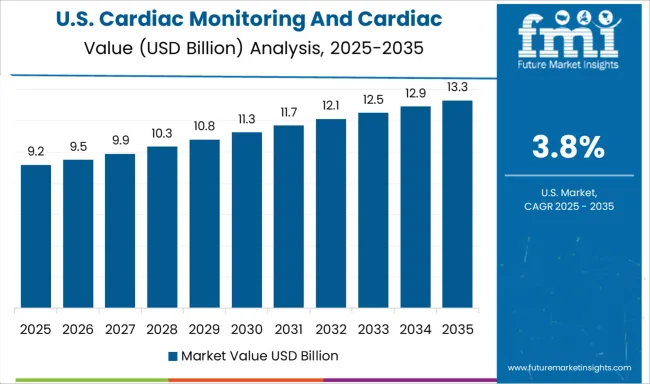
Demand for cardiac monitoring and cardiac rhythm management devices in the United States is expanding at a CAGR of 3.8%, driven by established healthcare infrastructure and continued innovation in cardiac care technologies. American healthcare providers are maintaining comprehensive cardiac care capabilities through adoption of advanced monitoring and treatment systems. The market benefits from substantial private investment and comprehensive reimbursement coverage for cardiac device procedures.
Healthcare technology investments are enabling the continued advancement of cardiac care delivery through the integration of innovative device technologies and clinical protocols. Professional medical development programs are maintaining clinical expertise among healthcare providers, enabling comprehensive cardiac care capabilities that support diverse patient populations and complex clinical requirements.
Revenue from cardiac monitoring and cardiac rhythm management devices in Brazil is growing at a CAGR of 3.3%, driven by the development of cardiac care capabilities and expanding healthcare access across the country. Brazilian healthcare institutions are investing in cardiac care technologies that can address growing cardiovascular disease prevalence and improve patient outcomes. Healthcare providers and medical institutions are establishing cardiac care programs to serve evolving patient needs.
Healthcare development programs are facilitating adoption of cardiac care technologies that support comprehensive patient treatment across diverse healthcare settings. Professional medical development initiatives are enhancing clinical capabilities among healthcare providers, enabling cardiac care delivery that meets evolving patient requirements and international quality standards.
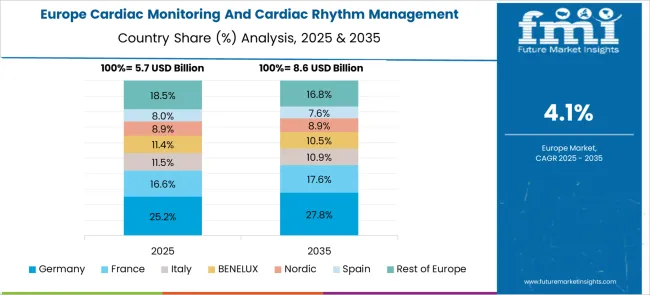
The cardiac monitoring and cardiac rhythm management devices market in Europe is projected to grow steadily across major countries, with Germany leading the regional market development. The United Kingdom maintains strong demand for cardiac devices, supported by comprehensive NHS coverage and established cardiac care protocols. France demonstrates a consistent investment in the adoption of cardiac technology, driven by healthcare modernization programs and aging population demographics.
Germany is expected to maintain its leadership position in European cardiac device consumption, supported by its advanced healthcare infrastructure and comprehensive cardiac care programs. The country benefits from established clinical research capabilities and a supportive reimbursement environment for innovative cardiac technologies.
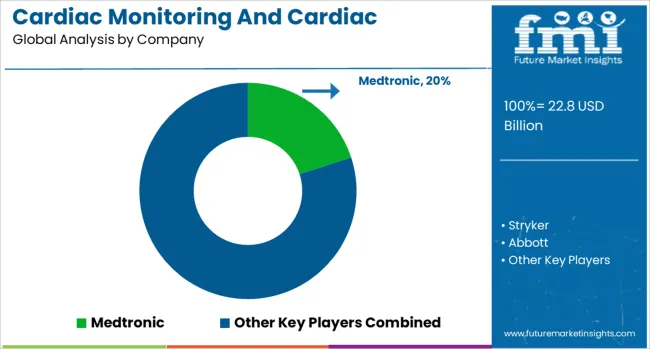
The cardiac monitoring and cardiac rhythm management devices market is defined by competition among medical device manufacturers, cardiac care specialists, and healthcare technology companies. Companies are investing in advanced device technologies, comprehensive clinical validation, regulatory compliance programs, and healthcare provider support to deliver safe, effective, and innovative cardiac care solutions. Strategic partnerships, clinical evidence development, and market access strategies are central to strengthening product portfolios and healthcare provider relationships.
Medtronic, United States-based, offers comprehensive cardiac rhythm management and monitoring solutions with focus on clinical innovation and patient outcomes. Stryker, United States, provides integrated cardiac care technologies with emphasis on surgical solutions and patient safety. Abbott, United States, delivers advanced cardiac device platforms with focus on minimally invasive procedures and remote monitoring capabilities. Boston Scientific Corporation, United States, emphasizes interventional cardiology solutions and comprehensive device portfolios. Koninklijke Philips N.V., Netherlands, focuses on cardiac monitoring technologies and integrated healthcare solutions. ZOLL Medical Corporation, United States, provides emergency cardiac care devices and resuscitation solutions. GE HealthCare, United States, offers comprehensive cardiac imaging and monitoring systems. MicroPort Scientific Corporation, China, NIHON KOHDEN CORPORATION, Japan, and Biotronik SE & Co KG, Germany, provide specialized cardiac device expertise, advanced manufacturing capabilities, and comprehensive clinical support across global cardiovascular care markets.
| Item | Value |
|---|---|
| Quantitative Units | USD 23 billion |
| Product Outlook | Cardiac rhythm management devices (CRT, defibrillators, pacemakers), cardiac monitoring devices (ECG, implantable cardiac monitors, holter monitors, mobile cardiac telemetry) |
| End Use | Hospitals, ambulatory surgery centers, others |
| Regions Covered | North America, Europe, East Asia, South Asia & Pacific, Latin America, Middle East & Africa |
| Country Covered | United States, Canada, United Kingdom, Germany, France, China, Japan, South Korea, India, Brazil, Australia and 40+ countries |
| Key Companies Profiled | Medtronic, Stryker, Abbott, Boston Scientific Corporation, Koninklijke Philips N.V., ZOLL Medical Corporation, GE HealthCare, MicroPort Scientific Corporation, NIHON KOHDEN CORPORATION, Biotronik SE & Co KG |
| Additional Attributes | Dollar sales by product type and end use, regional demand trends across North America, Europe, and Asia-Pacific, competitive landscape with established medical device manufacturers and emerging technology companies, clinical validation capabilities for different cardiac conditions and patient populations, integration with advanced monitoring technologies and remote patient management systems, innovations in minimally invasive procedures and wireless connectivity solutions, and adoption of AI-powered diagnostic systems with personalized treatment algorithms for enhanced patient outcomes and healthcare efficiency optimization. |
The global cardiac monitoring and cardiac rhythm management devices market is estimated to be valued at USD 22.8 billion in 2025.
The market size for the cardiac monitoring and cardiac rhythm management devices market is projected to reach USD 35.3 billion by 2035.
The cardiac monitoring and cardiac rhythm management devices market is expected to grow at a 4.5% CAGR between 2025 and 2035.
The key product types in cardiac monitoring and cardiac rhythm management devices market are cardiac rhythm management devices, _cardiac resynchronization therapy (crt), _defibrillator, _pacemakers, cardiac monitoring devices, _ecg, _implantable cardiac monitors, _holter monitors and _mobile cardiac telemetry.
In terms of end use outlook, hospitals segment to command 55.2% share in the cardiac monitoring and cardiac rhythm management devices market in 2025.






Our Research Products

The "Full Research Suite" delivers actionable market intel, deep dives on markets or technologies, so clients act faster, cut risk, and unlock growth.

The Leaderboard benchmarks and ranks top vendors, classifying them as Established Leaders, Leading Challengers, or Disruptors & Challengers.

Locates where complements amplify value and substitutes erode it, forecasting net impact by horizon

We deliver granular, decision-grade intel: market sizing, 5-year forecasts, pricing, adoption, usage, revenue, and operational KPIs—plus competitor tracking, regulation, and value chains—across 60 countries broadly.

Spot the shifts before they hit your P&L. We track inflection points, adoption curves, pricing moves, and ecosystem plays to show where demand is heading, why it is changing, and what to do next across high-growth markets and disruptive tech

Real-time reads of user behavior. We track shifting priorities, perceptions of today’s and next-gen services, and provider experience, then pace how fast tech moves from trial to adoption, blending buyer, consumer, and channel inputs with social signals (#WhySwitch, #UX).

Partner with our analyst team to build a custom report designed around your business priorities. From analysing market trends to assessing competitors or crafting bespoke datasets, we tailor insights to your needs.
Supplier Intelligence
Discovery & Profiling
Capacity & Footprint
Performance & Risk
Compliance & Governance
Commercial Readiness
Who Supplies Whom
Scorecards & Shortlists
Playbooks & Docs
Category Intelligence
Definition & Scope
Demand & Use Cases
Cost Drivers
Market Structure
Supply Chain Map
Trade & Policy
Operating Norms
Deliverables
Buyer Intelligence
Account Basics
Spend & Scope
Procurement Model
Vendor Requirements
Terms & Policies
Entry Strategy
Pain Points & Triggers
Outputs
Pricing Analysis
Benchmarks
Trends
Should-Cost
Indexation
Landed Cost
Commercial Terms
Deliverables
Brand Analysis
Positioning & Value Prop
Share & Presence
Customer Evidence
Go-to-Market
Digital & Reputation
Compliance & Trust
KPIs & Gaps
Outputs
Full Research Suite comprises of:
Market outlook & trends analysis
Interviews & case studies
Strategic recommendations
Vendor profiles & capabilities analysis
5-year forecasts
8 regions and 60+ country-level data splits
Market segment data splits
12 months of continuous data updates
DELIVERED AS:
PDF EXCEL ONLINE
Cardiac Rehabilitation Market Size and Share Forecast Outlook 2025 to 2035
Cardiac Valvulotome Market Size and Share Forecast Outlook 2025 to 2035
Cardiac Ultrasound Systems Market - Trends & Forecast 2025 to 2035
Cardiac Biomarker Diagnostic Test Kits Market Analysis – Trends & Forecast 2025 to 2035
Cardiac Reader System Market Growth – Trends & Forecast 2019 to 2027
Cardiac Medical Device Market
Cardiac Assist Devices Market Growth – Trends & Forecast 2025 to 2035
Cardiac Surgery Devices Market Analysis – Trends & Forecast 2024-2034
Cardiac Rhythm Management Market Insights - Trends & Forecast 2024 to 2034
Cardiac Rhythm Management Devices Market Size and Share Forecast Outlook 2025 to 2035
Cardiac Ambulatory Monitoring Market Size and Share Forecast Outlook 2025 to 2035
Cardiac Rhythm Remote Monitoring Devices Market Size and Share Forecast Outlook 2025 to 2035
Intracardiac Echocardiography Market Insights - Growth & Forecast 2025 to 2035
Intracardiac Imaging Market Trends – Industry Growth & Forecast 2024-2034
Mobile Cardiac Telemetry System Market Size and Share Forecast Outlook 2025 to 2035
MRI-Guided Cardiac Ablation Market Size and Share Forecast Outlook 2025 to 2035
Continuous Cardiac Monitoring Devices Market Size and Share Forecast Outlook 2025 to 2035
Companion Animal Cardiac Drugs Market Size and Share Forecast Outlook 2025 to 2035
Monitoring Tool Market Size and Share Forecast Outlook 2025 to 2035
Pet Monitoring Camera Market Size and Share Forecast Outlook 2025 to 2035

Thank you!
You will receive an email from our Business Development Manager. Please be sure to check your SPAM/JUNK folder too.
Chat With
MaRIA